5 Ways To Treat Heel Pain!
The toes and heels are the most load bearing components within your feet which take most of the weight when walking, running, exercising or even standing up. The heels are an especially vulnerable part of the body which can become painful either due to injuries or excessive stress put on it. Pain in your heels can also be a sign of other problems in your body.
Causes for heel pain-
1. Sprains or straining the leg: Exercising is one of the most common culprits behind heel damage. Wearing the wrong shoes over prolonged periods, which can cause your balance to be shifted and will lead you to put strain on your heels and cause pain. Falling or spraining during exercising or training can also cause heel pain.
2. Fractures: Stress or hairline fractures can occur even without impacts or trauma and also cause pain. It will slowly build up over time. In such cases, you should immediately consult a doctor and take remedial action.
3. Achilles tendon: A common cause for heel pain, the Achilles tendon connects the calf muscle to the heel. If this is torn or damaged, it can cause pain in your heel.
4. Arthritis: The deposition of uric acid crystals in parts of your body may result in arthritis; this is a fairly common cause for heel pain as well.
Treatments available-
1. Change in shoes: Shoes play a major role in the development of heel pain. You will either need to change the shoes or adjust the heels to ensure that they are at an equal and comfortable height and keep your posture natural and balanced.
2. Foot supports: There are specialized heel supports and wedges, which you can wear with the footwear. These supports help redistribute weight from the problem areas and uniformly distribute it among the other parts of the foot. Heel cups are also another form of supports you could try.
3. Pain relief medications: Sometimes aspirin or ibuprofen may be required to numb and dull the pain, if getting through the day becomes difficult or you are in the middle of work.
4. Resting: Sometimes resting is the only medication you can take to relieve the pain as it can only subside once the underlying conditions are corrected.
5. Ice packs: Cold compress and cold therapy would definitely help in numbing the area and providing temporary pain relief.
Platelet rich plasma therapy and prolotherapy injections can help in treatment of plantar fascitis.



+1.svg)
